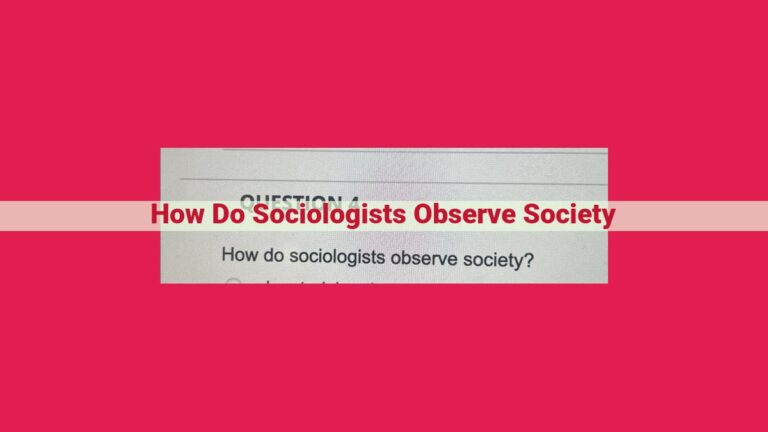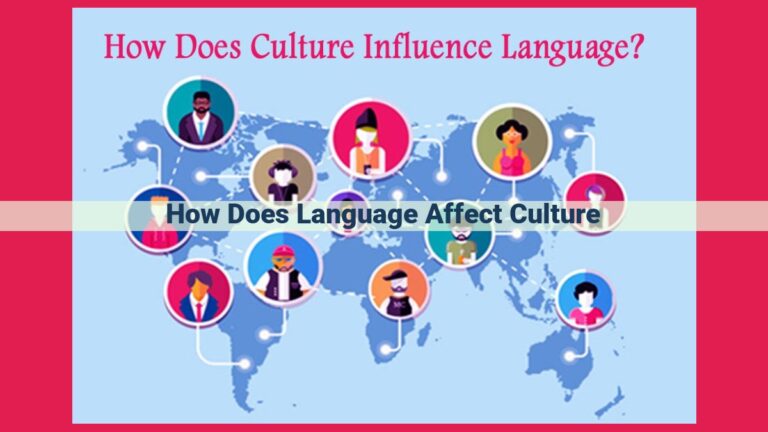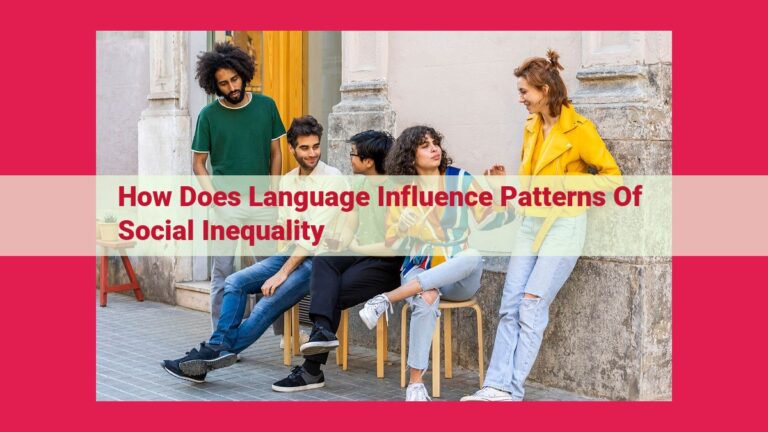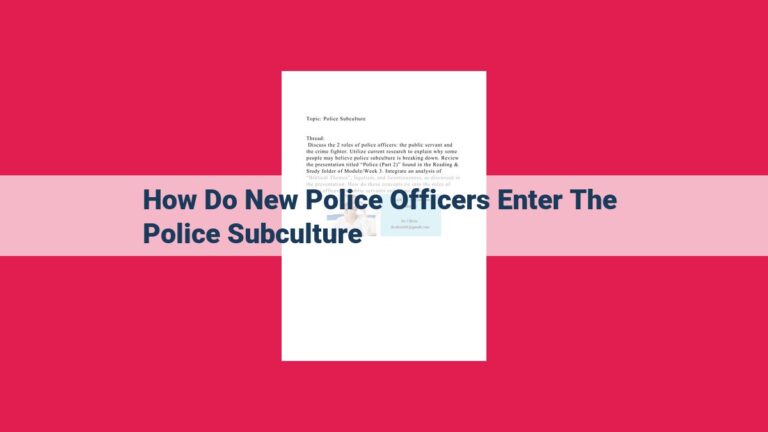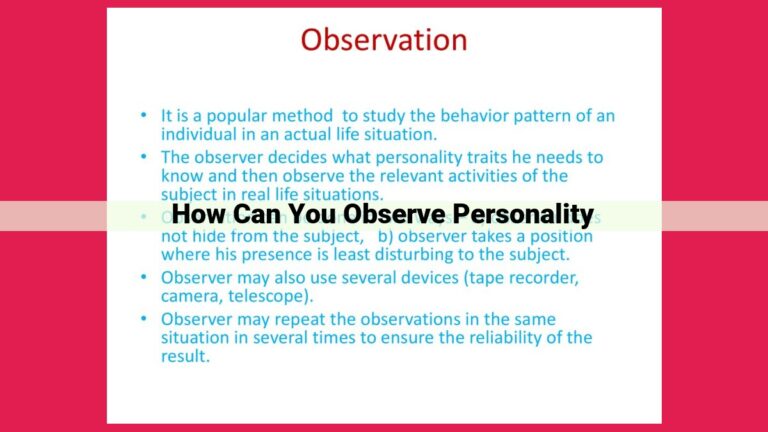Unlock The Power Of Sociological Imagination: Unraveling Patterns For Comprehensive Understanding
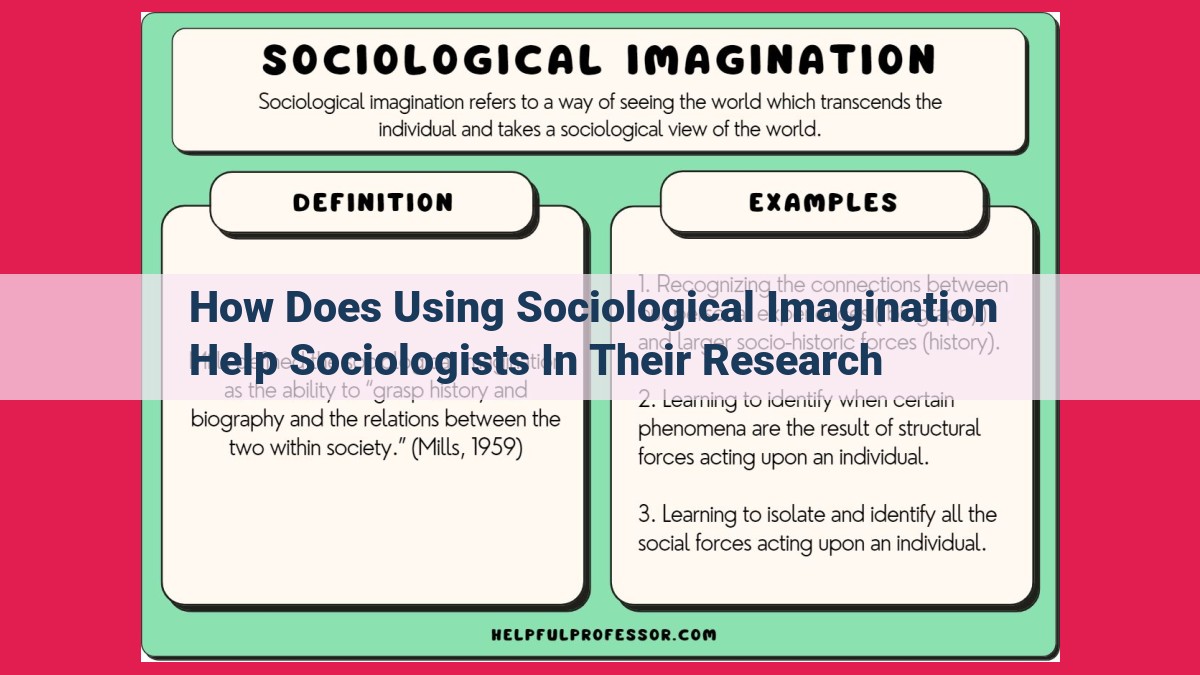
Sociological imagination enables sociologists to identify patterns in observations, apply them to broader contexts, and combine perspectives for comprehensive understanding. They can explore the interplay of individual and society, examining how social forces shape individual lives. Moreover, it helps sociologists develop critical thinking, open-mindedness, and cognitive flexibility to objectively analyze information and consider diverse perspectives.
The Magic of Abstraction: Uncovering Patterns in a World of Observations
In our daily lives, we are constantly bombarded with a multitude of sights, sounds, and experiences. To make sense of this vast array of information, our minds have developed an essential cognitive skill known as abstraction.
Abstraction allows us to identify patterns in our observations. We do this by extracting the key characteristics that define a particular phenomenon and disregarding the irrelevant details. For instance, when we see a series of similar objects, such as a collection of red apples, we can abstract the common feature of “redness” and create a mental category of “red objects.”
Through abstraction, we organize and simplify the world around us. It enables us to recognize and group similar events, ideas, or objects, allowing us to interpret and make sense of a complex reality. By identifying patterns, we can predict future outcomes and draw meaningful conclusions from our observations.
Generalization: Extending Patterns from Specific Cases to Broad Contexts
Unveiling Hidden Truths: The Art of Generalization
In the realm of understanding our complex world, we often stumble upon patterns within isolated observations. These patterns, like breadcrumbs leading us through a maze, hint at underlying principles that govern broader contexts. Generalization is the process by which we take these patterns observed in specific cases and apply them to wider groups or situations.
Imagine a young scientist observing a group of ants following a precise trail to their nest. She notices that every ant follows its predecessor closely, communicating through subtle pheromones. Intrigued, she wonders if this behavior extends beyond the confines of the observed colony. Through generalization, she hypothesizes that this trail-following behavior is a common characteristic of all ant species.
Extending patterns from one case to broader contexts is a crucial step in scientific inquiry and everyday decision-making. It allows us to draw meaningful conclusions based on limited observations. However, it’s essential to proceed with caution and consider the limitations of our generalizations.
Appropriate generalization requires careful consideration of the similarities and differences between the observed case and the broader context. A single isolated observation may not be sufficient to warrant a sweeping generalization. By considering multiple cases, examining relevant data, and seeking expert opinions, we can increase the confidence in our generalizations.
In essence, generalization is a powerful tool that enables us to extrapolate knowledge beyond the confines of our immediate observations. By systematically applying patterns from specific cases to broader contexts, we can uncover hidden truths and gain a deeper understanding of the world around us.
Discuss how we combine perspectives to form a comprehensive understanding (synthesis).
Synthesis: Uniting Perspectives for a Comprehensive Understanding
Throughout our lives, we encounter a multitude of perspectives and experiences that shape our understanding of the world. Synthesis is the remarkable ability to combine these diverse perspectives into a comprehensive and harmonious whole. It is the art of weaving together threads of knowledge to create a richer tapestry of understanding.
Imagine a group of friends gathered around a campfire, each sharing their unique perspectives on a recent event. One may have witnessed it from afar, another experienced it firsthand, and a third heard about it from a reliable source. By synthesizing their accounts, they collectively piece together a more complete picture, uncovering nuances and insights that would have remained hidden to any individual perspective.
The Steps of Synthesis
Synthesis is not a passive process; it requires active engagement and critical thinking. The first step is to gather diverse perspectives from a variety of sources, ensuring that we are not limiting ourselves to a narrow echo chamber. Once we have collected these viewpoints, we can begin to identify patterns and similarities among them.
The next step is to evaluate the credibility and relevance of each perspective, considering its source, evidence, and biases. This critical assessment allows us to separate reliable information from unsubstantiated claims. By weighing the strengths and weaknesses of each perspective, we can determine which insights are most valuable and pertinent to our understanding.
Finally, we can integrate the perspectives into a coherent whole. This involves finding connections between seemingly disparate viewpoints and reconciling any contradictions. By doing so, we create a comprehensive understanding that is greater than the sum of its parts.
The Benefits of Synthesis
The power of synthesis lies in its ability to:
- Expand our perspectives: By considering multiple perspectives, we broaden our understanding of the world and challenge our own assumptions.
- Enhance our critical thinking: Synthesis requires us to evaluate information and draw connections, fostering our analytical abilities.
- Facilitate decision-making: A comprehensive understanding of a situation allows us to make more informed decisions, taking into account different viewpoints and potential consequences.
- Promote empathy: By understanding others’ perspectives, we develop empathy and compassion, fostering a more harmonious society.
Introduce the field of sociology and its focus on society as a whole.
Sociology: Unveiling the Tapestry of Society
Step into the realm of sociology, a captivating discipline that unveils the intricate tapestry of society. Sociologists embark on a quest to unravel the complex interplay of individuals and the collective. By studying society as a whole, they shed light on our social patterns, cultural norms, and the institutions that shape our lives.
Sociology’s Microscope: Uncovering the Social Landscape
Sociologists approach society with a keen eye for detail, dissecting its social structures, power dynamics, and cultural beliefs. They delve into the processes that socialize us into our roles and transmit cultural values across generations. By understanding these intricate mechanisms, we gain invaluable insights into the forces that mold our social world.
Individuality and Society: A Delicate Dance
Sociology recognizes that individuals are both products and participants in society. Our social experiences profoundly influence our perspectives, values, and behaviors. At the same time, our individual actions contribute to the larger social tapestry. Through this dynamic interplay, we shape and are shaped by the collective.
How Social Psychology Unravels Individual Behavior in Social Settings
Social psychology, a fascinating field of study, delves into the interplay between individuals and the social environments they inhabit. It unveils the intricate ways in which our thoughts, feelings, and actions are shaped by the presence and behavior of others.
Imagine yourself at a bustling party. As you navigate the crowd, your mind is constantly absorbing information. You observe body language, conversations, and subtle cues. This process, known as social perception, allows you to make judgments about the intentions and emotions of others.
Social psychologists investigate how social situations influence our behavior. They examine how the presence of others can enhance or inhibit our performance, such as in the classic bystander effect. They also explore the impact of social norms, cultural expectations, and power dynamics on our actions.
Furthermore, social psychology sheds light on the concept of social identity. We form these identities by associating with different groups or categories, such as family, friends, or colleagues. These identities influence how we perceive ourselves, interact with others, and make decisions.
By unraveling the complex interactions between individuals and their social settings, social psychology equips us with a deeper understanding of human behavior. This knowledge empowers us to navigate social situations more effectively, build stronger relationships, and contribute to a more harmonious society.
The Interplay of Individual and Society: The Role of Social Structure
Our lives are shaped not only by our individual experiences but also by the social structures in which we live. These structures, such as family, education, and government, provide us with support, guidance, and limitations.
Socialization and Cultural Norms
From a young age, we are socialized into our culture through interactions with our family, peers, and community. This process teaches us the values, beliefs, and behaviors that are acceptable in our society. These norms influence our thoughts, feelings, and actions.
Social Stratification
Societies are often stratified into layers based on factors such as wealth, education, and power. This social hierarchy affects our access to resources, opportunities, and life chances. Individuals born into higher social classes tend to have better health, education, and economic outcomes than those born into lower classes.
Power Dynamics
Social structures also involve power dynamics. Some individuals and groups have more authority and influence than others. This can lead to inequality and discrimination, shaping individual lives in profound ways. For example, people from marginalized groups may face barriers to education, employment, and housing.
Social structure plays a fundamental role in shaping our individual lives. It influences our values, behaviors, and life outcomes. Understanding the nature and impact of social structure is crucial for promoting social justice, equity, and the well-being of all members of society.
Socialization and Its Molding Influence on Cultural Norms
In the tapestry of human societies, socialization emerges as an intricate thread, weaving together the fabric of our cultural identities. This process, spanning the cradle to the grave, profoundly shapes our beliefs, values, and behaviors, imbuing us with a sense of belonging and purpose.
From the tender embrace of our families to the bustling classrooms of our schools, we absorb the norms and expectations of our surroundings like sponges. Through countless interactions, we learn to decipher the unspoken rules that guide our interactions, from polite greetings to appropriate table manners. These cultural norms become second nature, shaping our perceptions of right and wrong, acceptable and unacceptable.
As we navigate our social landscape, peers and mentors play a crucial role in reinforcing these cultural norms. They serve as mirrors, reflecting back to us the values that are held in high esteem. Through their guidance and support, we develop a sense of self that is both unique and deeply intertwined with our cultural heritage.
The Profound Influence of Societal Beliefs and Practices on Behavior
Throughout history, societies have developed complex systems of beliefs and practices that shape the behaviors of their members. These cultural norms, moral values, and social expectations exert a profound influence on our thoughts, feelings, and actions.
Consider the impact of religious beliefs on behavior. In many societies, religion plays a central role in shaping social norms and individual conduct. Religious teachings often provide moral guidelines, ethical principles, and expectations for behavior that influence how people interact with others, make decisions, and view the world.
Furthermore, societal practices can also have a significant impact on behavior. For example, educational systems shape how we learn, think, and interpret information. They instill certain values and beliefs, such as the importance of critical thinking, cooperation, and respect.
Economic systems also influence behavior by determining how resources are distributed and how people earn a living. Different economic structures can lead to varying levels of social inequality and affect the choices and opportunities available to individuals.
In conclusion, societal beliefs and practices exert a profound influence on our behavior. By understanding the cultural context in which we live, we can gain deeper insights into our own actions and the behaviors of others, fostering greater empathy, understanding, and social harmony.
Power Dynamics and the Distribution of Resources and Authority
In the tapestry of human societies, power dynamics weave an intricate web that shapes the allocation of resources and authority. Power, the ability to influence others’ behavior, manifests in various forms, from personal charisma to institutional authority.
Power structures within societies often determine who has access to valuable resources, such as wealth, education, and healthcare. Those with greater power can command greater shares, while those with less power may struggle to meet basic needs. This inequality can create significant disparities in opportunities and life outcomes.
Authority, the legitimate right to exercise power, is another key element in the distribution of resources and authority. Leaders, whether elected or appointed, are entrusted with the authority to make decisions that affect society. However, the exercise of authority is not always fair or equitable. Bias, prejudice, and personal interests can influence decision-making, leading to unequal treatment for different groups or individuals.
Power dynamics can also perpetuate social inequalities, such as those based on race, gender, and socioeconomic status. Marginalized groups may have less access to resources and authority, leading to disparities in health, education, and economic opportunity. Understanding these power dynamics is crucial for addressing social injustice and promoting a more equitable society.
The Power of Critical Thinking: Unlocking Objective Analysis
In a world inundated with information, critical thinking emerges as an invaluable tool to navigate the vast ocean of data. It empowers us to sift through the noise, discern truth from falsehood, and make informed judgments.
Critical thinking is the ability to objectively analyze information, breaking it down into its constituent parts and evaluating its validity. It involves questioning assumptions, examining evidence, and drawing logical conclusions. By employing this rigorous process, we can avoid falling prey to biases, misinformation, and emotional appeals.
One of the key aspects of critical thinking is the ability to identify bias. Bias can stem from our personal experiences, beliefs, and preconceptions. It can cloud our judgment and lead us to favor certain perspectives over others. By being aware of our biases, we can take steps to mitigate their influence and ensure that our analysis is objective.
Evaluating evidence is another crucial element of critical thinking. We must assess the credibility of sources, determine the relevance of information, and identify any potential flaws or inconsistencies. By weighing the evidence carefully, we can separate fact from fiction and form well-informed opinions.
Finally, drawing logical conclusions is the culmination of the critical thinking process. Based on the evidence we have gathered and the biases we have identified, we can make inferences and reach conclusions. However, it’s essential to be cautious and avoid making assumptions that are not supported by the facts.
By embracing critical thinking, we unlock the power to objectively analyze information, make informed decisions, and navigate the complexities of our world with greater clarity and confidence.
The Value of Open-mindedness: Embracing Multiple Perspectives for a Broader Understanding
In the tapestry of human experience, open-mindedness stands as a beacon of enlightenment, illuminating *diverse viewpoints* and broadening our horizons. Embracing multiple perspectives is not merely an intellectual exercise; it’s an essential life skill that fosters greater understanding, empathy, and informed decision-making.
Consider the renowned scientist who dedicated years to a particular theory, only to have it shattered by a single, groundbreaking experiment. This scientist’s open-mindedness allowed him to confront his preconceptions, leading to a profound scientific breakthrough. Similarly, in the realm of personal relationships, open-mindedness enables us to empathize with others, even those with whom we fundamentally disagree.
By actively seeking out and listening attentively to different perspectives, we not only expand our knowledge but also challenge our assumptions. This open-minded approach prevents us from becoming narrow-minded and dogmatic, fostering instead a flexible and adaptable mindset. It’s this adaptability that allows us to navigate a complex and ever-changing world.
In the age of information overload, open-mindedness is more crucial than ever. We are constantly bombarded with contradictory viewpoints and biased information. Critical thinking requires us to evaluate these diverse perspectives with an open and discerning mind, allowing us to form well-informed opinions and make sound judgments.
Remember, open-mindedness is not about abandoning our beliefs or accepting everything uncritically. It’s about recognizing the value in different perspectives and engaging in respectful dialogue. By embracing multiple perspectives, we enrich our understanding, foster empathy, and ultimately pave the way for a more enlightened and progressive society.
Cognitive Flexibility: Adapting to Life’s Unpredictable Currents
Amidst the tumultuous waters of life, our ability to navigate shifting circumstances is crucial for survival. Cognitive flexibility, like a dynamic rudder, allows us to adjust our sails and navigate the unpredictable currents with ease.
Imagine yourself at the helm of a ship, the wind howling against your sails. As a storm approaches, the waves crash violently, threatening to overwhelm your vessel. Suddenly, you realize that the wind has changed direction. With lightning-fast reflexes, you adjust the sails, shifting the angle to catch the new breeze.
In the same way, our brains possess the remarkable ability to adapt to changing circumstances. When faced with unexpected twists and turns, cognitive flexibility allows us to modify our thoughts, behaviors, and strategies to meet the demands of the moment.
Like a chameleon blending into its surroundings, we can quickly adapt our thinking to fit different situations. We can shift our focus from one task to another, adjusting our priorities and perspectives as needed. This mental agility empowers us to navigate the labyrinth of life’s complexities with confidence and resilience.
Empathy and Understanding: The Power of Social Perspective-Taking
To truly connect with others and foster harmonious relationships, it’s crucial to develop empathy and understanding. Social perspective-taking plays a pivotal role in this regard, enabling us to step into another person’s shoes and experience the world through their eyes.
What is social perspective-taking?
Social perspective-taking is the ability to recognize and understand the beliefs, feelings, and motivations of others, even if they differ from our own. It involves putting ourselves in someone else’s place and seeing the world from their unique vantage point.
The Benefits of Social Perspective-Taking
Harnessing the power of social perspective-taking offers numerous benefits for our relationships and overall well-being:
- Enhanced communication: By understanding others’ perspectives, we can communicate more effectively, tailoring our messages to resonate with their experiences and viewpoints.
- Reduced conflict: When we can see things from another person’s perspective, it’s easier to resolve conflicts amicably, finding common ground and mutually acceptable solutions.
- Greater connection: Social perspective-taking fosters a deeper level of connection and empathy, allowing us to build stronger and more meaningful relationships.
How to Develop Social Perspective-Taking
Developing social perspective-taking is an ongoing journey that requires conscious effort and practice. Here are a few tips to help you cultivate this valuable skill:
- Active listening: Engage in active listening when others are speaking, paying attention not only to their words but also to their non-verbal cues and body language.
- Mindful observation: Be observant of the people around you, noticing their behaviors, interactions, and reactions. Try to infer their thoughts and feelings based on what you observe.
- Role-playing exercises: Participate in role-playing exercises where you take on different characters and perspectives. This practice can enhance your ability to empathize with others.
Remember, social perspective-taking is not about agreeing with others or losing your own perspective. Rather, it’s about expanding your understanding and recognizing the validity of different viewpoints. By embracing this skill, you can unlock a world of empathy, connection, and harmonious interactions.
Emotional Intelligence: The Key to Managing Emotions and Fostering Connections
In the tapestry of human interactions, emotional intelligence stands as a vibrant thread, weaving together the complex emotions that shape our relationships and define our experiences. It is the ability to recognize, understand, and effectively manage our emotions, as well as those of others.
The importance of emotional intelligence cannot be overstated. It serves as a compass, guiding us through the often turbulent waters of social interactions. It allows us to make sound decisions, build healthy connections, and maintain positive relationships.
Imagine yourself in a heated argument with a loved one. Emotions run high, and words pierce like daggers. In this moment, emotional intelligence serves as a beacon of clarity, helping you to step back, identify your feelings, and respond with empathy and understanding. Instead of reacting defensively, you approach the situation with a newfound perspective, fostering a more productive and meaningful conversation.
Emotional intelligence also plays a crucial role in building strong connections. When we are able to sense and respond to the emotions of others, we create a bridge of understanding that fosters trust and intimacy. We become better listeners, more compassionate friends, and more supportive partners.
It is not simply about suppressing or bottling up our emotions but rather about harnessing their power to navigate life’s challenges. By developing our emotional intelligence, we cultivate a sense of inner harmony, reduce stress, and increase our well-being.
In essence, emotional intelligence is the key to unlocking our human potential. It allows us to live more fulfilling lives, connect more deeply with others, and make a positive impact on society. By embracing the power of emotional intelligence, we can transform our relationships, our communities, and the world around us.
Developing Empathy and Understanding
Cultural Awareness: Key to Respect and Understanding
Embracing cultural awareness is paramount for fostering respect and understanding amidst the tapestry of diverse beliefs that weave our world together. It’s not just about acknowledging differences but deeply appreciating the unique perspectives and values that shape each culture.
Imagine yourself embarking on a journey to a distant land. You encounter people from vastly different backgrounds, speaking unfamiliar languages and adhering to customs that might initially seem alien. If you approach these encounters with an open mind, you’ll begin to uncover the rich tapestry of human experiences.
By listening attentively to the stories of those around you, you’ll gain invaluable insights into their beliefs, motivations, and aspirations. You’ll learn about their struggles, celebrations, and the traditions that have shaped their lives. This knowledge will help you step outside your own cultural lens and see the world through their eyes.
Cultural awareness fosters empathy—the ability to put yourself in someone else’s shoes and truly understand their experiences. By seeking out and engaging with people from different backgrounds, you’ll break down barriers of prejudice and build bridges of understanding.
Remember, each culture is a unique expression of human creativity and ingenuity. By embracing cultural diversity, we not only enrich our own lives but also contribute to a more harmonious and inclusive society. Respect and understanding are the cornerstones of a thriving global community, and cultural awareness is the key that unlocks their power.
Social Stratification: Its Impact on Individuals
In the tapestry of human society, individuals occupy diverse positions, influenced by a hierarchy of social strata. Social stratification categorizes society into distinct layers, assigning varying levels of privilege, status, and opportunity to each. This stratification can profoundly shape the life experiences of individuals, exerting a significant impact on their well-being, aspirations, and opportunities.
At the base of the stratification pyramid, individuals may struggle with limited access to resources, education, and healthcare. They may face discrimination and prejudice based on their social class, hindering their ability to achieve their full potential. At the apex, individuals enjoy substantial advantages, including access to quality education, healthcare, and employment opportunities. They may possess greater influence and control over social and political decisions.
The consequences of social stratification extend beyond material disparities. It can also erode individuals’ mental health and self-esteem. Those at the lower strata may experience feelings of powerlessness and marginalization. Conversely, those in higher strata may develop a sense of entitlement and superiority. This can lead to social unrest and conflict, as individuals from different strata compete for resources and recognition.
Understanding social stratification is crucial for addressing its negative effects. By recognizing the systemic nature of inequality, we can develop policies and interventions aimed at reducing disparities and promoting social mobility. Only by breaking down the barriers of social stratification can we create a society where all individuals have the opportunity to thrive and reach their full potential.
Economic Inequality and its Impact on Social Mobility
Economic inequality has become a pressing concern in many societies, as the gap between the wealthy and the rest of the population widens. One of the most significant consequences of this inequality is its impact on social mobility, the ability of individuals to move up or down the socio-economic ladder.
For those born into poverty, the climb up the socioeconomic ladder can be daunting, if not impossible. Limited access to education, healthcare, and quality housing can create barriers that are difficult to overcome. They may be forced to accept low-paying jobs with little opportunity for advancement, perpetuating a cycle of poverty.
On the other hand, individuals born into wealthy families often have a leg up in life. They have access to better education, healthcare, and social networks, which open doors to high-paying jobs and positions of influence. This can exacerbate the gap between the rich and the poor, making it even harder for those from disadvantaged backgrounds to improve their socioeconomic status.
Economic inequality also affects social mobility by limiting access to resources and opportunities. Those with higher incomes can afford to invest in their children’s education, healthcare, and extracurricular activities, while those with lower incomes may struggle to provide basic necessities like food and shelter. This creates a cycle of unequal opportunities, where the children of wealthy parents have a greater chance of succeeding than the children of poor parents.
In conclusion, economic inequality has a profound impact on social mobility. It creates barriers for those from disadvantaged backgrounds and perpetuates a cycle of poverty. By addressing economic inequality, we can create a more just and equitable society where everyone has a fair chance to succeed, regardless of their socioeconomic status.
Examine racial and ethnic disparities and their underlying causes.
Racial and Ethnic Disparities: Unveiling the Underlying Causes
In the realm of social inequality, racial and ethnic disparities stand as sobering reminders of the injustices that persist in our society. Examining their underlying causes is crucial for fostering a deeper understanding of the systemic barriers that prevent marginalized communities from thriving.
Historical Legacy of Discrimination
The roots of racial and ethnic disparities can be traced back to centuries of oppression and discrimination. From the horrors of slavery to the Jim Crow era, systemic racism has cast a dark shadow over the lives of people of color. This history has left an indelible mark on their access to education, healthcare, housing, and other essential resources.
Economic Inequality and Poverty
Economic inequality exacerbates racial and ethnic disparities. Structural barriers such as lack of access to quality education, job discrimination, and limited housing affordability perpetuate a cycle of poverty that disproportionately affects marginalized communities. Redlining, a discriminatory practice that denied mortgages to people in certain neighborhoods based on race, has also contributed to economic disparities between racial groups.
Cultural Biases and Stereotypes
Implicit biases and stereotypes held by individuals and institutions can perpetuate racial and ethnic disparities. These subconscious beliefs can influence everything from hiring decisions to healthcare treatment. For example, studies have shown that Black patients are more likely to be prescribed lower doses of pain medication than White patients, even for the same level of pain.
Mass Incarceration and the Criminal Justice System
The criminal justice system has also played a significant role in perpetuating racial and ethnic disparities. Mass incarceration, particularly of Black men, has torn apart families and communities. Racial profiling and biased sentencing practices have further contributed to the disproportionate incarceration rates of people of color.
Examining the underlying causes of racial and ethnic disparities requires a multifaceted approach that addresses historical, economic, cultural, and systemic factors. By understanding these causes, we can work towards dismantling the barriers that prevent marginalized communities from achieving equality and justice.
Civic Literacy: The Key to Unlocking Social and Political Understanding
In the intricate tapestry of society, our actions and decisions are inextricably intertwined with the social and political systems that govern us. To navigate this complex landscape effectively, it is imperative to possess civic literacy, an essential cognitive tool that empowers us to comprehend the workings of our society and engage meaningfully in the political process.
Defining Civic Literacy
Civic literacy is the knowledge and skills necessary to understand the fundamentals of government, social structures, and public policy. It encompasses an awareness of historical and contemporary social issues, an understanding of political processes, and the ability to analyze and evaluate information critically.
Importance of Civic Literacy
Civic literacy is critical for active citizenship, enabling us to make informed decisions about our communities and the world around us. By understanding the complexities of our social and political systems, we can hold our leaders accountable, advocate for our values, and work towards a more just and equitable society.
Furthermore, civic literacy promotes social harmony by fostering mutual understanding and reducing political polarization. When citizens possess a shared knowledge of their rights and responsibilities, they can engage in constructive dialogue and work together to address societal challenges.
Civic literacy is an indispensable asset for anyone who desires to make a meaningful contribution to society. By embracing this essential skill, we unlock the power to navigate the social and political landscape, actively shape our communities, and create a brighter future for all.
**Public Policy: Shaping Social Outcomes and Addressing Societal Issues**
In the tapestry of human society, public policy serves as a vibrant thread that weaves together the fabric of our communities. It is an intricate art, forged in the crucible of societal challenges and aspirations, with the power to transform social outcomes and address pressing problems.
Public policy, the intersection of government decisions and social well-being, encompasses a vast array of laws, regulations, and programs that touch every aspect of our lives. From the roads we drive on to the healthcare we receive, from the air we breathe to the safety of our neighborhoods, public policy plays a pivotal role in shaping our collective destiny.
When crafted with wisdom and foresight, public policy can be a potent force for good. It can foster economic growth, reduce poverty, and promote equality. It can improve education, strengthen healthcare systems, and protect the environment for generations to come.
For instance, the Social Security Act of 1935 stands as a testament to the power of public policy to alleviate human suffering. This landmark legislation established a safety net for millions of Americans, providing retirement income, disability benefits, and healthcare coverage for the most vulnerable among us.
However, public policy is a double-edged sword. When poorly conceived or implemented, it can exacerbate the very problems it seeks to solve. Unintended consequences can ripple through society, undermining trust and widening social divides.
That is why evidence-based research and informed deliberation are essential to effective public policymaking. By grounding policy decisions in rigorous data and diverse perspectives, we can increase the likelihood of positive outcomes and mitigate potential risks.
Public policy is not a static entity but an ever-evolving tapestry, reflecting the changing needs and aspirations of our society. As we navigate the challenges of the 21st century, from climate change to economic inequality, we must continue to engage in thoughtful and inclusive dialogue about the public policies that will shape our future.
Only through the collective wisdom of our citizens, the expertise of our policymakers, and the unwavering commitment to justice and equality can we harness the transformative power of public policy to create a society that is truly just, equitable, and sustainable for all.
Social Science Research: Unlocking Evidence-Based Insights
Unraveling the complexities of human behavior and social phenomena requires a rigorous and systematic approach. Social science research emerges as a beacon of truth, providing evidence-based insights that illuminate our understanding of the world around us.
Bridging the Gap between Theory and Practice:
Social science research serves as a bridge between theoretical frameworks and real-world applications. By collecting data, analyzing patterns, and testing hypotheses, researchers uncover actionable insights that can guide policymakers, practitioners, and individuals alike.
Empowering Informed Decision-Making:
Armed with evidence-based findings, policymakers can make informed decisions that effectively address social issues. By understanding the underlying causes of inequality, poverty, or crime, they can craft policies that directly target the root problems.
Guiding Societal Progress:
Social science research not only aids in decision-making but also drives societal progress. By studying the changing dynamics of social structures, cultural norms, and technological advancements, researchers contribute to the evolution of human civilization.
Examples of Impactful Research:
- The Coleman Report (1966): Pioneering research that quantified the impact of school resources on student achievement, leading to increased funding for underprivileged areas.
- The Felson Study (1998): Groundbreaking work that showed crime rates are influenced by environmental factors such as street lighting and police presence, informing crime prevention strategies.
- The Social Genome Project: A large-scale study that maps the social interactions of millions of individuals, providing insights into the formation of social networks and the spread of ideas.
Social science research is an essential tool for understanding the complexities of human behavior and social phenomena. By providing evidence-based insights, it empowers policymakers, practitioners, and individuals to make informed decisions, drive societal progress, and create a more just and equitable world.
